|
|
|
Sort Order |
|
|
|
Items / Page
|
|
|
|
|
|
|
| Srl | Item |
| 1 |
ID:
167332
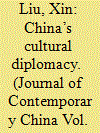

|
|
|
|
|
| Summary/Abstract |
This article explores the prominent features of China’s state-led campaign of cultural diplomacy. Through multiple comparative case studies of its flagship project of the Confucius Institute (CI), it aims to identify and contextualise the various variables affecting its effective operation. It finds that this dependent variable is mainly determined by the independent variable of the CI’s ability to localise its product and process to suit different target audiences, along with a number of extraneous variables, including ideology, nationalism and the media environment in the destinations. People-to-people interaction is also an important mediator that contributes to facilitating mutual understanding. All the variables and the complexity of their inter-relations constitute the Chinese characteristics and are charted out in a diagram.
|
|
|
|
|
|
|
|
|
|
|
|
|
|
|
|
| 2 |
ID:
148502
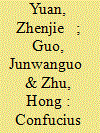

|
|
|
|
|
| Summary/Abstract |
The majority of Anglophone literature tends to portray Confucius Institutes as playing a successful role serving China’s interests in its foreign collaborations. So far, the threat of this institution has been largely stereotyped and even taken for granted. Few scholars question the influence and capacity of the institution on both global and local scales. Relying on cartograms, correlation and national image analyses as well as qualitative studies, this article examines the influence of Confucius Institutes as the institution globalized and localized. This article reports three main findings: (1) the geopolitical influence of Confucius Institutes is uneven in different regions and they are engaged in an ongoing process of geopolitical construction; (2) analyses of correlation with China’s national image show that not only does the influence of the institution vary in regions but also that the project could have a negative impact on bilateral cooperation, suggesting that, contrary to popular thinking, Confucius Institutes have not had a positive impact on China’s global interests; and (3) the capacity of the institutes in everyday operations is systematically limited, reflecting China’s inexperience in managing this global cultural network. Confucius Institutes are generous in making economic concessions but are hesitant during political negotiations, which can be said to mirror China’s patchy performance in economic and political reform.
|
|
|
|
|
|
|
|
|
|
|
|
|
|
|
|
| 3 |
ID:
129089
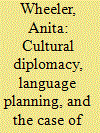

|
|
|
|
|
| Publication |
2014.
|
| Summary/Abstract |
As China's economic and political presence in Africa increases, so does the need for its government to maintain a favorable image with African publics. Borrowing theories of soft power diplomacy and language planning, this paper analyzes, from the perspectives of African and Chinese policymakers, the impact of the Confucius Institutes on higher education in Africa and its intersections with language planning and cultural diplomacy. An empirical case study at the University of Nairobi Confucius Institute shows that policymakers and administrators anticipate that a competent group of Kenyans with Mandarin language skills will be able to engage with Chinese people and Chinese-owned companies on the ground in Kenya. However, Chinese diplomats are more concerned with China's image and achieving its political and economic interests in Kenya than with effective cultural exchange and language instruction.
|
|
|
|
|
|
|
|
|
|
|
|
|
|
|
|
| 4 |
ID:
164064
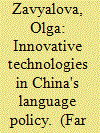

|
|
|
|
|
| Summary/Abstract |
Improvements in artificial intelligence are considered by the Chinese leadership one of the strategic spheres of state development. Modern linguistic technologies are being broadly introduced by Chinese linguists in the country. In the near future, they will also be used as "soft power" for creating an attractive image of China in foreign countries.
|
|
|
|
|
|
|
|
|
|
|
|
|
|
|
|
| 5 |
ID:
192840
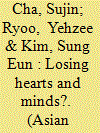

|
|
|
| 6 |
ID:
185619


|
|
|
|
|
| Summary/Abstract |
This article examines China's most controversial soft power export – the Confucius Institute initiative – through the case study of its promotion and implementation in Ethiopia. As one of China's closest partners in Africa, Ethiopia presents a path-breaking case for examining the potential and the limitations of Confucius Institutes. In contrast to the existing literature that depicts Confucius Institutes largely as contested and limited initiatives, this article shows that Confucius Institutes and Confucius Classrooms have thus far been relatively successful in Ethiopia. Specifically, China's fusion of practical or tangible benefits with language and cultural promotion – what I describe as “pragmatic enticement” – invokes support from key participants in this project, including university administrators, students and Chinese teachers. In the long term, however, even in the highly favourable context of Ethiopia, the sustainability of Confucius Institutes is questionable, as there are apparent gaps between the rising expectations of Ethiopian administrators and students, and the limited resources on the ground.
|
|
|
|
|
|
|
|
|
|
|
|
|
|
|
|
| 7 |
ID:
167630


|
|
|
| 8 |
ID:
190077
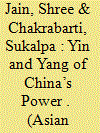

|
|
|
|
|
| Summary/Abstract |
The Pew Research Center survey reports an increasing unfavorable view of China worldwide. In the Soft Power 30 index, China fares at a rank of 27th, far behind its aim of global leadership. The world’s leading economic power (in terms of purchasing power parity), a military power second only to the United States, a nation with a formidable global presence, a robust civilization and culture, however, still struggles to generate international affinity and credibility one might expect of the great middle kingdom. Acknowledging the benefits of soft power, China has continuously been engaged in the competitive politics of attraction, legitimacy, and credibility; however, Beijing’s charm offensive still has limited appeal in the outside world. The popular assessments point toward China’s authoritarian political model or poor state of civil liberties for the limited effectiveness of its soft power push. However, in this article we argue that besides the political and ideological factors limiting its soft power, China’s absolute or relative soft power gains are majorly undercut because of its coercive diplomacy exercised with the unbridled pursuit of its core national interests and hyper-nationalism. The article provides an interpretive illustration of how China’s disposition to rely on hard power instruments of carrot (inducement) and stick (threat, coercion, or intimidation) to get desired outcomes undermines the quest and effect of its soft power.
|
|
|
|
|
|
|
|
|
|
|
|
|
|
|
|
|
|
|
|
|